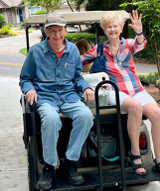The Ghost of Christmas Past
Unlike Ebenezer Scrooge’s ghost, my “ghost of Christmas past,” didn’t haunt me with bad deeds, greediness or distant memories. Instead, it caused an intense aching pain that validated my loss of dreams. For many holidays after the death of my son, Chad, the ghost of Christmas past could haunt my memories and shake my spirit long before the air was filled with the miracles and magic of the holiday season. The chains that linked me to holidays-gone-by were ever so real.
Prior to Chad’s death, my holiday memories were rich with tradition, child-like anticipation and remembrance of good times. One of my favorite memories of Chad occurred when he was about eight years old. In the children’s Christmas program, he played one of the three kings in search of the Baby Jesus, and his gift to Him was a teddy bear. I can still picture the smile on his face as he marched across the makeshift stage in his regal robe. With a lump in my throat, I was filled with loving pride. I’ll also never forget his last holiday with us. He was be-ginning his own life as a grown young man with his own apartment and his own Christmas tree. His own dreams were beginning to unfold.
For the first few holidays, the emotional walls I built in an attempt to preserve the visions of holidays-past prevented my spirit from healing. I thought the walls would shelter me from my pain by keeping old memories fresh. Instead, my memories became scarred with tears and soiled with self-pity. I couldn’t even find joy in the real reason for the season. The ghost of Christmas past lived within me, and I feared nothing could take it away from me.
In my journey through grief, I’ve learned that the underlying challenge in dealing with most grief experiences is accepting that grief (like life) is about adjusting to change. Managing that change means sorting through complex emotions, making trial-and-error attempts to change the way we do things, and putting forth a valiant effort at rewriting our future and rebuilding our dreams.
"Change” During the Holidays
For the bereaved, holidays represent difficult change. As humans, we like to believe that we are flexible.
We welcome change that makes things easier for us, but we resist with the greatest tenacity difficult change that affects our lifestyle and our relationships. I remember sitting on the golf course in August, five months after Chad died and saying to my sister, “I don’t know what I am going to do about the holidays. I just can’t handle it!” I was consumed with the unknown.
It’s Okay to Change
People who grieve aren’t alone in adopting new traditions. Others have given us their examples. When families change due to marriage, divorce, children, job relocation, military deployment or college etc., we accept that it’s okay to change the way we celebrate to accommodate these life changes. We think little of doing so. In fact, we often become very creative in how we manage that change. Therefore, the death of a family member should also be considered an acceptable change, and we should expect our families and friends to be supportive and understanding. In my first year of grieving, I didn’t understand this. I struggled to make everything “the way it was” even though I knew it could never be. But I had enough common sense to know that I had to modify my traditions to cope with the emotional holidays ahead.
That’s when my husband, Gary, and I began formulating a plan. We vowed to shake the dread that threatened to tarnish our good memories, chase away our family and friends and turn our lives into bitter defeat. We agreed to be open and honest with each other as we discussed how to proceed.
That’s when my husband, Gary, and I began formulating a plan. We vowed to shake the dread that threatened to tarnish our good memories, chase away our family and friends and turn our lives into bitter defeat. We agreed to be open and honest with each other as we discussed how to proceed.
Formulating A Plan
First, we made a list of our primary traditions.
Second, we each scored our personal preference for each tradition.
Third, we recorded them on a chart—like the one below.
We each had our own chart of traditions, and we scored them by preference on a scale of 1 to 5 with 5 being time honored (we wanted to keep these traditions.)
Attending special church service 5-5
Attending holiday programs 3-5
Attending holiday parties 2-3
Decorating a tree 5-4
Sending holiday cards 2-3
Dinner at Grandma’s on Christmas Eve 4-4
Large family dinner on Christmas Day 4-4
Baking cookies, etc. 2-3
Finally, we determined what we could live without, and which traditions were essential to keep. Anything that we scored 3 or lower could easily be eliminated or temporarily discontinued. We then took the items that rated 4 and 5, discussed them and made compromises. A compromise sometimes meant re-evaluating how we did the tradition before and accepting that we could both give a little and modify it.
Initiating the Changes
We took our decisions to the family, and, surprisingly, the changes met little resistance. Holiday religious services were meaningful; we agreed to leave that unchanged. Hosting the holiday dinner would be difficult. We didn’t want to give that up entirely, so we compromised on how we would handle it. Our invitation to dinner included a set time of 6:30 to 10:00 p.m. We chose not to host any Christmas Day celebration.
With great emotional pain, we trimmed a Christmas tree but changed the theme to reflect our loss into hope with ornaments of angels, bells, nativity characters, stars and white lights.
While these were the major changes, even the best-laid plans can backfire. We dressed to go to the evening church services and as we were about to leave, both of us were overcome with incredible sadness and tears. We just couldn’t face the celebration service, so we didn’t go. For the next few years, we went to holiday services at a different church until we could go to our own again.
I felt relieved that I was not obligated to continue everything in the same way as I had in the past.
The limited-time holiday dinner was a good choice. Loving family surrounded us, and it was only during the last few minutes of goodbyes that we became truly emotional. On Christmas Day, we were invited out for dinner. We notified our hostess well in advance that we might only stay for a short time. When we felt “uncomfortable.” we excused ourselves and went home. We still continue these modified traditions today.
The truth is some of us never truly adjust to change, but we compensate by shifting our attitudes to accept what has altered our lives. This makes it even more important to have an evolving process for change and the addition of rituals that make it bearable.
Rituals for Remembrance
One time-honored ritual came from my mother: lighting a candle in remembrance. Our candle glows for at least twenty-four hours, beginning at noon on Christmas Eve Day. It signifies love and remembrance for deceased family members.
We added the ritual of placing “living flowers” on our holiday table to remind us of how fortunate we are to have each other, breathe the same air and share our love. The flowers absorb the euphoria of love and peace. After our celebration, we take a few of the flowers from the bouquet to the cemetery, where we intertwine them with the cedar and evergreen boughs of Chad’s wreath.
We also adopted a ritual of making snow angels at the cemetery for the benefit of our Down’s-syndrome daughter, Jalane, because she received such great pleasure in doing this. Though the snow doesn’t always cooperate, we do it whenever we can. We scatter angel confetti, join hands, plop down on the bed of white next to Chad, and we make angels. (I have to admit that it’s usually Jalane doing this now as we have aged.)
Changing traditions doesn’t mean that the Ghost of Christmas past doesn’t stop at my door anymore, it means I’ve found ways to make him leave quicker. By modifying our traditions to meet our changed lives, we’ve controlled the ghost of Christmas past who had threatened to destroy our memories. The good memories live in my heart, and the haunting melody of “if only” has since vanished. Now, my spirit dances with the visions of treasured moments. Each year, I remember Chad—the child king—and I give his teddy bear a hug to say, “Thanks for being a part of my life.” The sorrow can fade, but the memories and love will last forever.
About the Author
Nan Zastrow
Wings was created as a ministry of hope by Nan and Gary Zastrow after the death of their son, Chad Zastrow. On April 16, 1993, Chad died as a result of suicide. Nan is the author of five books, a quarterly online grief eLetter and dozens of articles published in various resources. Since 2003, Nan regularly publishes articles in Grief Digest Magazine. Visit the website at: www.wingsgrief.org or the Wings Facebook page.




